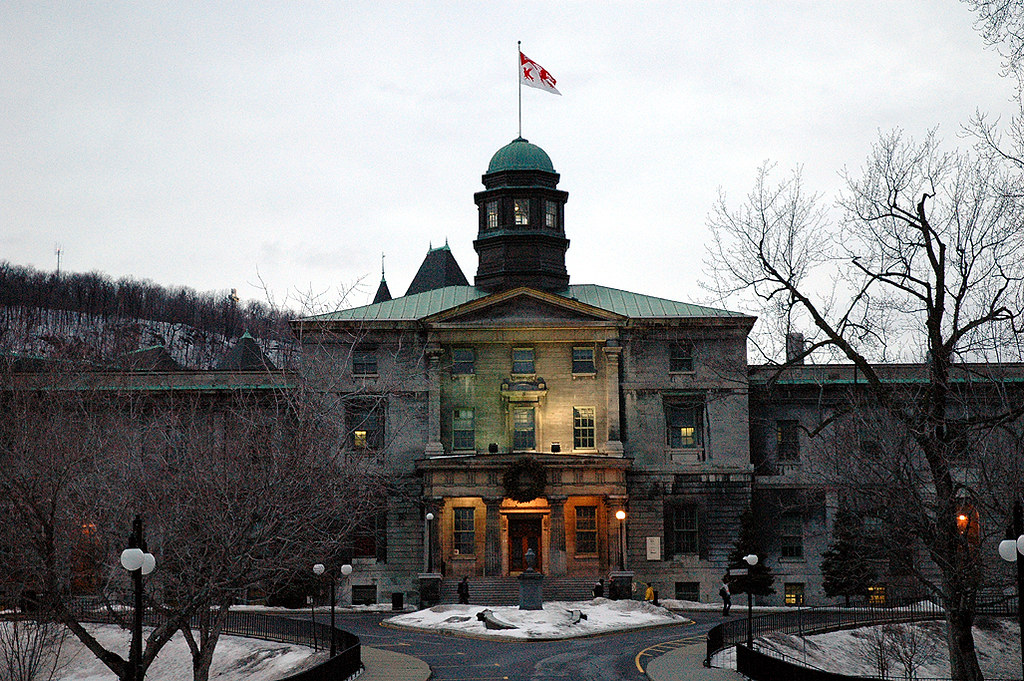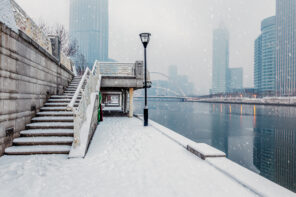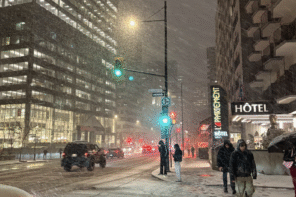On December 3, McGill confirmed that in-person exams would be held, despite the rise of the new COVID-19 omicron variant. A new strain brought heightened concerns and students began to feel unsafe in a room like the Fieldhouse, where hundreds of students would be writing exams at the same time. McGill administration assured students and faculty that the situation was being closely monitored: new protocols would be instituted to ensure the safest environment possible, including the measurement of exam rooms’ CO2 levels. Omicron was certainly something to worry about, but not enough to make any rash decisions.
McGill claimed this so, citing the WHO to support their choice: “While the World Health Organization (WHO) has designated it as a variant of concern, worthy of close investigation, the WHO also notes that it is not clear at this point whether the Omicron strain is more transmissible or causes more severe illness.” Having in-person exams was not predicted to cause any severe outbreaks.
McGill decided to force their students to accommodate the university’s determination to hold in-person exams.
Regardless of students’ fears, McGill ran with this choice. It seemed that the administration had conveniently taken “not clear” to mean “unlikely” in this situation, because less than a month later, cases are surging throughout the city. Omicron now poses a serious threat to the pseudo-stability we enjoyed in the fall.
Two doses of the vaccine aren’t so much protection from infection at this point but from serious illness. Melissa Hawkins, an epidemiologist and public health worker at American University, explained that “vaccines are around 30%-40% effective at preventing infections and 70% effective at preventing severe disease.” Without a booster—which is being found to bump effectiveness back up—contracting omicron is much more likely, even as a vaccinated person. While you may not get that sick, you will still test positive. And testing positive during the holidays is the last thing you want when you’re about to board a plane home with hundreds of other people to see your loved ones.
McGill’s December 3rd email took this factor into consideration, but not in an empathetic way. Rather, the administration encouraged students to “reconsider international travel.” As travel restrictions are tightening throughout the world, the risk of being unable to return to Montreal for Winter term is rapidly increasing. But instead of accounting for this and keeping students safe enough to return to their families, McGill decided to force their students to accommodate the university’s determination to hold in-person exams. I have friends who have made it home and are testing positive the next day after contracting COVID-19 in Montreal. Required tests for travel cannot detect existing infection if there is not enough of a viral load, meaning that a student can be infected on Monday, fly home on Wednesday, and only be detectable by Friday. And as I sit here writing this article, I am facing the consequences of McGill’s actions, not my own.
This week, my friend group started getting sick. New people were testing positive every day. A common thread between their experiences? Most completed in-person exams during the past week, and/or they have been in the library. Having been exposed to them, I’ve been tested several times, and although I am negative as of now, my chances of going home for Christmas are in jeopardy. I wouldn’t be able to celebrate with my family. I couldn’t see my long-distance partner. I have elderly relatives who are at-risk for infection, and I don’t know which Christmas will be the last one I spend with them. I am faced with the possibility of quarantining in my apartment and spending the holidays without my closest family. Some of my friends have already had their holidays jeopardized. For many students, this is the first opportunity to visit their families since August, or even longer. I’m lucky enough to have received the booster when I went home back in November, but most people have not had the chance yet.
If just one person was able to pass the virus on, we can only expect that the virus then traveled to the library, to residences, to dining halls, to student households, and eventually to airports—with a few to no people realizing that they were infected yet.
Of course, it is possible that these cases did not stem from exams or the library. Nevertheless, people are getting sick, and COVID-19 is spreading quickly. This week, McGill released statistics on positive cases within examinations on their COVID-19 Situation Dashboard. The table records the number of cases suspected to have been active during exams, ranging from December 3rd to 15th. As of now, only 1-2 cases have been detected within the exams listed. At first glance, it seems that in-person exams have not contributed much to an outbreak in cases.
However, knowing that a sizable amount of exams were held with even just one positive individual is not very comforting. Scientists suspect that omicron spreads faster than the SARS-CoV-2 virus. While they remain unsure whether the new variant spreads quicker than its predecessor, delta, we do know that omicron is dangerous even in a room of fully vaccinated individuals. If just one person was able to pass the virus on, we can only expect that the virus then traveled to the library, to residences, to dining halls, to student households, and eventually to airports—with a few to no people realizing that they were infected yet.
It frankly does not matter in the slightest to me that omicron does not seem to be widely transmitted in exams. Saying that very few cases are being traced back to the gyms is a convenient way for the administration to cover their costs and avoid accountability. The truth is that the administration does not know yet whether or not exams have impacted student health; there simply has not been enough time to see if anyone is sick. Symptoms can take up to 14 days to appear, and illness can often go unnoticed by people who are fully vaccinated since symptoms can be very mild. For instance, a runny nose can be attributed to cold weather, but it is a main symptom of omicron. With in-person exams running until December 21, take McGill’s current statistics with a grain of salt. We may not know how bad of an outbreak is ensuing, but judging by the exponential increase in the number of cases in Quebec, it is plausible to expect a big one.
I considered myself lucky in that I only had one in-person exam to attend this semester. At 9 in the morning on December 8th, we marched into the Fieldhouse and were promptly asked to change our masks with new, clean ones provided. Sounds like a decent idea, I thought, until I walked in to see maybe a dozen cardboard boxes of masks on a table, with empty boxes and masks scattered on the floor around it. There was no dispenser, like the ones in campus buildings—just boxes into which every person who walked through the door stuck their hand. I took off the new mask I had already put on at home and replaced it with a mask touched by god-knows how many people before me. I felt entirely unsafe in the massive, unventilated room, surrounded by at least 200 people feeling the same, no matter how much hand sanitizer was provided.
Furthermore, having remote courses hold in-person exams is baffling and unnecessary. I was in ENVR 201 this semester, which had an enrollment of over 150 students, which required the course to be delivered entirely online. My single in-person exam was for this course. I cannot imagine what the reasoning for this was, as my other, smaller classes held remote exams. Did this occur for scheduling reasons? Was this course truly impossible to shift to an online format? Was a professor permitted to hold an in-person exam for a massive introductory class? Perhaps I will never understand, but I can say for sure this decision was not made for the sake of student safety. Why bother having online classes to protect us when the administration will throw us to the wolves later on?
We may not know how bad of an outbreak is ensuing, but judging by the exponential increase in the number of cases in Quebec, it is plausible to expect a big one.
McGill also provided no other accommodation for people already sick with COVID-19. The only option was to apply for deferred exams, which, I will remind you, aren’t available until February 28, 2022, according to McGill’s website. Offering no safer alternatives practically encourages symptomatic students to enter the exam room. Who wants to take a Fall term exam halfway through Winter term? McGill’s lack of action screams, “If you contract an extremely-transmissible disease in our examination rooms, then you’re out of luck.” And students are supposed to pay for that ridiculous treatment––leaving us to question what was the point of this risk? McGill has been doing online learning for a year. There is no excuse that they have not figured it out.
Ultimately, McGill has expected students to sacrifice their health and precious time off to sit an in-person exam. We’ve been asked to prioritize our academics over our overall well-being, our families, and our holiday plans. Students do not trust McGill with their safety. We’re tired of saying, “We told you so.” I do not pay international tuition to have my opportunities to return home risked by a university that chooses to be retroactively sorry over proactively safe.








